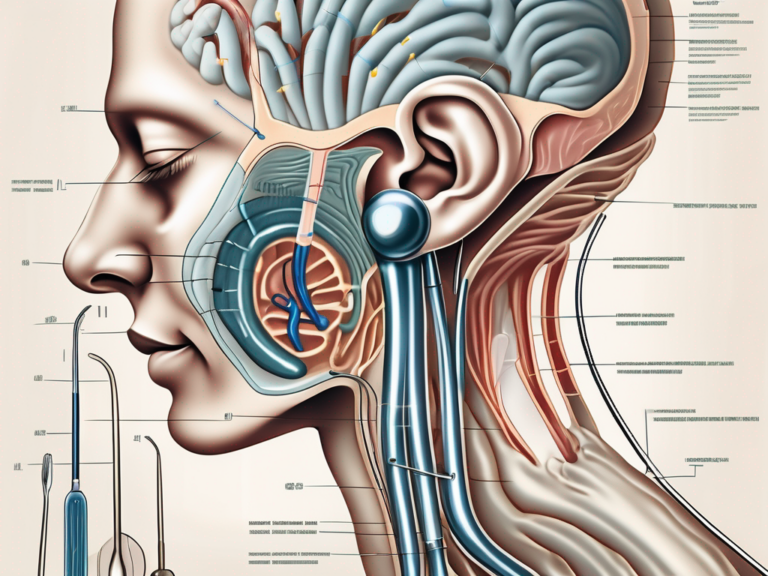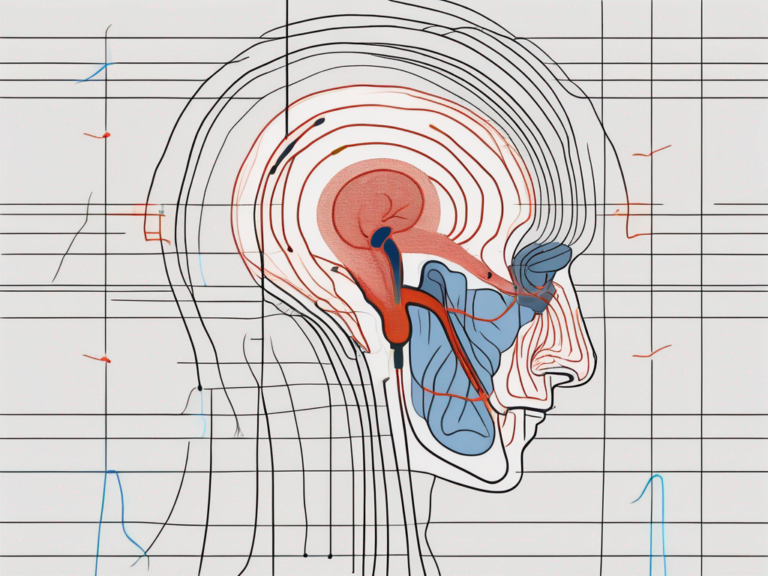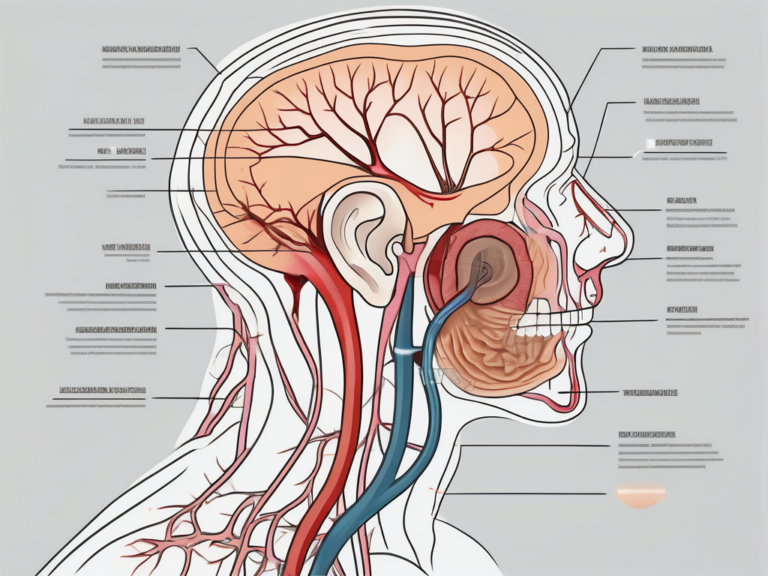Acute inflammation of the vestibular nerve can be distressing and debilitating for old dogs. This condition affects the balance and coordination of dogs, leading to symptoms such as dizziness, loss of appetite, and difficulty walking. As a pet owner, it is important to understand the causes, diagnosis, and treatment options available for this condition. In this article, we will explore the various aspects of treating acute inflammation of the vestibular nerve in old dogs, providing valuable insights into the condition and its management.
Understanding Acute Inflammation of the Vestibular Nerve
Before delving into the treatment options, it is crucial to have a thorough understanding of acute inflammation of the vestibular nerve. The vestibular nerve plays a vital role in maintaining balance and spatial orientation in dogs. It is a part of the inner ear and connects to the brain, relaying important information about the position and movement of the head. When this nerve becomes inflamed, it disrupts the normal functioning of the vestibular system, leading to a range of symptoms.
Acute inflammation of the vestibular nerve can be a challenging condition for both dogs and their owners to navigate. The sudden onset of symptoms can be alarming, and understanding the underlying causes is essential in developing an effective treatment plan.
There can be various causes behind the inflammation of the vestibular nerve in old dogs. Understanding these causes is essential in identifying appropriate treatment strategies.
What is the Vestibular Nerve?
The vestibular nerve, also known as the eighth cranial nerve, is responsible for transmitting sensory information from the inner ear to the brain. It consists of two branches, the superior and inferior vestibular nerves, which provide input to the brain about head movement, position, and balance.
The intricate network of the vestibular nerve allows dogs to maintain their balance and navigate their surroundings with ease. It is a complex system that relies on precise communication between the inner ear and the brain.
Causes of Inflammation in the Vestibular Nerve
There are several possible causes of inflammation in the vestibular nerve. Infections, such as otitis media or otitis interna, can lead to inflammation and affect the functioning of the nerve. Other potential causes include trauma, tumors, and idiopathic vestibular disease, which has no apparent cause.
Older dogs are more prone to developing vestibular nerve inflammation due to age-related degeneration or underlying health conditions. The gradual wear and tear on the body can make the nerve more susceptible to inflammation and disruption in its normal functioning.
It is important to consult a veterinarian for a proper diagnosis to determine the cause of the inflammation and develop an appropriate treatment plan. Identifying the underlying cause is crucial in providing targeted and effective treatment.
Symptoms of Vestibular Nerve Inflammation in Dogs
The symptoms of vestibular nerve inflammation can vary in severity and duration. Common signs include a sudden loss of balance, head tilt, rapid eye movements (nystagmus), nausea, vomiting, and difficulty walking. These symptoms can be distressing for both the dog and the owner, warranting immediate medical attention.
When a dog experiences vestibular nerve inflammation, their world is turned upside down. The loss of balance and disorientation can be disconcerting, leading to anxiety and confusion. It is essential for owners to provide a calm and supportive environment for their furry companions during this challenging time.
If you notice any of these symptoms in your old dog, it is crucial to consult a veterinarian for a proper diagnosis. Do not attempt to diagnose or treat the condition on your own without professional guidance. A veterinarian will be able to conduct a thorough examination and recommend appropriate treatment options based on the specific needs of your dog.
Diagnosis of Vestibular Nerve Inflammation in Old Dogs
Diagnosing vestibular nerve inflammation in old dogs requires a comprehensive veterinary examination and assessment. Your veterinarian will perform a thorough physical examination, focusing on the dog’s head, neck, and ears. They will also inquire about the dog’s medical history and any recent incidents or changes in behavior.
Older dogs are more prone to vestibular nerve inflammation due to age-related changes in their bodies. The vestibular system, responsible for maintaining balance and coordination, can become inflamed and cause a range of symptoms such as head tilt, loss of balance, and difficulty walking. Identifying the underlying cause of the inflammation is crucial for effective treatment.
Veterinary Examination and Assessment
During the examination, the veterinarian will evaluate the dog’s balance, gait, and coordination. They will observe how the dog moves, looking for any abnormalities in their posture or movement patterns. By carefully examining the head, neck, and ears, the veterinarian can identify any signs of inflammation or infection.
In addition to the physical examination, the veterinarian may also perform specific tests to assess the functioning of the vestibular system. These tests may include observing the dog’s eye movements, known as nystagmus, which can provide valuable information about the integrity of the vestibular system.
The veterinarian will also take into consideration the dog’s medical history and any recent incidents or changes in behavior. This information can help in determining the possible causes of vestibular nerve inflammation, such as trauma, ear infections, or underlying health conditions.
Diagnostic Tests and Procedures
In order to determine the underlying cause of the vestibular nerve inflammation, your veterinarian may recommend additional diagnostic tests and procedures. These tests aim to rule out other potential causes and provide a more accurate diagnosis.
Blood work is often conducted to check for signs of infection or inflammation in the dog’s body. Elevated white blood cell count or abnormal levels of certain proteins can indicate an ongoing inflammatory process. Cultures may also be taken from the ears or other affected areas to identify any potential bacterial or fungal infections that could be contributing to the inflammation.
In some cases, the veterinarian may recommend imaging tests such as X-rays or magnetic resonance imaging (MRI) to get a closer look at the dog’s head and neck. These tests can help rule out other underlying causes, such as tumors or structural abnormalities.
Biopsies may also be performed to examine tissues for possible tumors or abnormal cell growth. This procedure involves taking a small sample of tissue and sending it to a laboratory for analysis. The results can provide valuable information about the nature of the inflammation and guide further treatment decisions.
It is important to comply with all recommended tests and procedures to ensure an accurate diagnosis and effective treatment approach. Early detection and intervention can greatly improve the prognosis for dogs with vestibular nerve inflammation.
Treatment Options for Acute Inflammation of the Vestibular Nerve
Successful treatment of acute inflammation of the vestibular nerve in old dogs depends on addressing the underlying cause and managing the resulting symptoms. Treatment options may include medication, physical therapy, rehabilitation, and, in some cases, surgical interventions.
Acute inflammation of the vestibular nerve can be a distressing condition for both dogs and their owners. The vestibular nerve is responsible for transmitting information about balance and spatial orientation from the inner ear to the brain. When this nerve becomes inflamed, it can lead to symptoms such as dizziness, loss of balance, head tilt, and difficulty walking.
Medication and Drug Therapy
Medication can help alleviate the symptoms associated with vestibular nerve inflammation. Depending on the underlying cause, your veterinarian may prescribe anti-inflammatory drugs, antibiotics, or medications to address nausea and vomiting. It is important to administer these medications as prescribed and follow the recommended dosage.
Anti-inflammatory drugs, such as corticosteroids, can help reduce the inflammation in the vestibular nerve and provide relief from symptoms. Antibiotics may be prescribed if the inflammation is caused by an infection. Medications to address nausea and vomiting can help manage these uncomfortable symptoms that often accompany vestibular nerve inflammation.
However, it is vital to note that the choice and dosage of medication should be determined by a qualified veterinarian. Self-medicating or administering over-the-counter drugs without professional guidance can be detrimental to your dog’s health.
Physical Therapy and Rehabilitation
Physical therapy and rehabilitation play a crucial role in helping older dogs recover from vestibular nerve inflammation. These therapies focus on improving balance, strength, and coordination. Your veterinarian may recommend exercises and techniques to assist your dog in regaining their mobility and minimizing potential complications.
Physical therapy exercises for dogs with vestibular nerve inflammation may include gentle movements to improve balance, such as standing on unstable surfaces or walking on a treadmill with a harness for support. These exercises can help stimulate the vestibular system and promote the recovery of normal function.
In addition to physical therapy exercises, rehabilitation techniques such as massage and hydrotherapy can also be beneficial. Massage can help relax muscles and improve blood circulation, while hydrotherapy provides a low-impact way for dogs to exercise and build strength.
Surgical Interventions
In certain cases, surgical interventions may be necessary to address the underlying cause of the vestibular nerve inflammation. This can include removing tumors or repairing damage to the vestibular system. The decision to proceed with surgery will depend on the specific circumstances and should be made in consultation with a veterinary specialist.
Surgery for vestibular nerve inflammation is typically reserved for cases where conservative treatments have been ineffective or when there is a clear structural issue that needs to be addressed. The surgical procedure will vary depending on the underlying cause, but the goal is to alleviate the inflammation and restore normal function to the vestibular nerve.
It is important to note that surgical interventions carry risks and should only be considered after a thorough evaluation and discussion with a veterinary specialist. They may involve general anesthesia and a period of post-operative recovery, during which your dog will require close monitoring and follow-up care.
In conclusion, treatment options for acute inflammation of the vestibular nerve in old dogs can range from medication and physical therapy to surgical interventions. The choice of treatment will depend on the underlying cause and the severity of the symptoms. It is crucial to work closely with your veterinarian to develop a tailored treatment plan that addresses your dog’s specific needs and maximizes their chances of recovery.
Home Care and Management of Dogs with Vestibular Nerve Inflammation
While vet-recommended treatment is essential, providing appropriate home care and management can contribute to the overall well-being and recovery of dogs with vestibular nerve inflammation.
Dogs with vestibular nerve inflammation may experience a range of symptoms, including loss of balance, head tilt, and difficulty walking. It is important to create a supportive environment that promotes their comfort and safety.
Dietary Adjustments for Dogs with Vestibular Disease
During the recovery phase, it may be necessary to make dietary adjustments for dogs with vestibular nerve inflammation. Your veterinarian may recommend a specific diet to meet your dog’s nutritional needs and aid in their recovery. It is important to follow these recommendations and monitor your dog’s appetite and weight regularly.
Some dogs with vestibular nerve inflammation may experience a decreased appetite or difficulty eating due to their balance issues. In such cases, your veterinarian may suggest feeding smaller, more frequent meals or offering softer food options that are easier for your dog to chew and swallow.
Exercise and Activity Recommendations
Exercise and physical activity should be tailored to the individual dog’s needs and abilities. While it is important to prevent excessive physical exertion, gentle exercise can help maintain muscle tone and promote overall well-being. Consult with your veterinarian to determine the appropriate exercise regimen for your dog.
Engaging in low-impact activities, such as short walks or gentle play sessions, can provide mental stimulation and help prevent muscle atrophy. It is important to monitor your dog during exercise and avoid activities that may exacerbate their symptoms or cause discomfort.
Comfort and Safety Measures at Home
Providing a safe and comfortable environment is vital for dogs with vestibular nerve inflammation. Minimize obstacles and hazards that could lead to falls or injury. Consider providing supportive bedding and using non-slip surfaces to enhance stability. Your veterinarian may also recommend assistive devices, such as harnesses or ramps, to aid in mobility.
Creating a calm and quiet space for your dog can help reduce stress and anxiety, which may worsen their symptoms. Avoid sudden loud noises or excessive activity in their immediate surroundings. Providing a familiar and secure environment can help them feel more at ease during their recovery.
Additionally, maintaining a consistent daily routine can provide a sense of stability and predictability for your dog. Regular feeding times, exercise sessions, and rest periods can help them adjust to their new normal and aid in their overall recovery.
Prognosis and Long-Term Outlook for Dogs with Vestibular Nerve Inflammation
The prognosis for dogs with vestibular nerve inflammation varies depending on the underlying cause, overall health, and available treatment options. While many dogs show improvement within days to weeks, some may experience residual symptoms or require long-term management.
Factors Influencing Prognosis
Factors that can influence the prognosis include the dog’s age, overall health, the presence of any underlying conditions, and the cause of the vestibular nerve inflammation. It is important to have realistic expectations and to work closely with your veterinarian to monitor the dog’s progress and make any necessary adjustments to the treatment plan.
Potential Complications and Risks
Although rare, there can be potential complications and risks associated with vestibular nerve inflammation. These may include recurrent episodes of inflammation, persistent balance issues, hearing loss, or cognitive impairments. Regular follow-up appointments with your veterinarian can help identify and address any potential complications.
Quality of Life Considerations
Assessing the dog’s quality of life is an important consideration when managing vestibular nerve inflammation in older dogs. While the symptoms can be distressing, many dogs can adapt and maintain a good quality of life with appropriate care and management. However, in some severe cases, the impact on the dog’s quality of life may prompt discussions about potential palliative care options. These decisions should be made in consultation with your veterinarian.
Prevention of Vestibular Nerve Inflammation in Dogs
Preventing vestibular nerve inflammation in dogs is challenging as some causes are unavoidable or may be a result of age-related degeneration. However, certain measures can help reduce the risk and promote overall well-being in older dogs.
Regular Health Check-ups and Vaccinations
Regular visits to your veterinarian are essential for maintaining your dog’s health. Routine vaccinations can help prevent certain infections that may lead to vestibular nerve inflammation. Your veterinarian will also be able to monitor any age-related changes and provide appropriate recommendations for preventive care.
Balanced Diet and Nutrition
A balanced diet and proper nutrition are crucial for older dogs. Providing a high-quality diet that meets your dog’s specific needs can support their overall health and immune system. Consult with your veterinarian for dietary recommendations tailored to your dog’s individual requirements.
Reducing Exposure to Risk Factors
While it may not always be possible to eliminate all risk factors, minimizing exposure can help reduce the likelihood of vestibular nerve inflammation. For example, monitoring your dog’s ears for signs of infection, avoiding excessive head trauma or rough play, and providing a safe environment can all contribute to reducing the risk of inflammation.
In conclusion, acute inflammation of the vestibular nerve in old dogs requires careful diagnosis, appropriate treatment, and ongoing management. It is important to consult with a qualified veterinarian for an accurate assessment and tailored treatment plan. While the condition can be distressing, with proper care and support, many dogs can experience significant improvement in their symptoms and enjoy a good quality of life.









+ There are no comments
Add yours